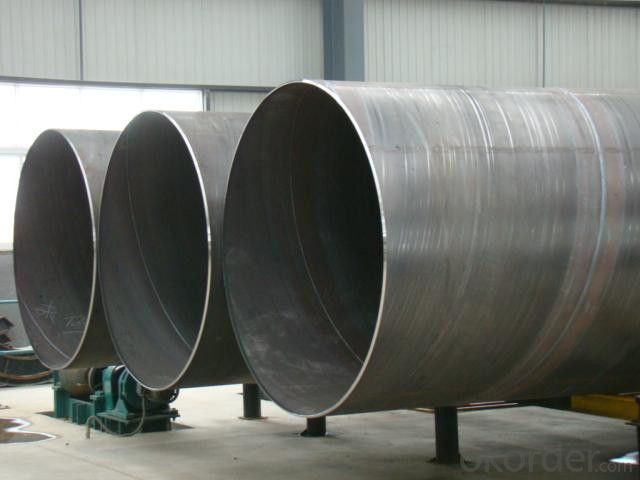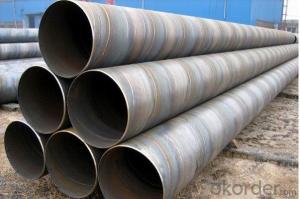Welded Steel Pipe -- China Top Supplier
- Loading Port:
- Tianjin
- Payment Terms:
- TT OR LC
- Min Order Qty:
- 25 m.t.
- Supply Capability:
- 7000 m.t./month
OKorder Service Pledge
OKorder Financial Service
You Might Also Like
1、Structure of Welded Steel Pipe AL53:
Welded Steel Pipe is formed by drawing a solid billet over a piercing rod to create the hollow shell. As the manufacturing process does not include any welding, and we can provide you any size and any type of pipes you want, and the most important is we can sure the quality of production.
2、Main Features of the Welded Steel Pipe ASTM AL53:
• High manufacturing accuracy
• Harder and Powerful strength
• Have small inertia resistance
• Strong heat dissipation ability
• Good visual effection
• Reasonable price
3、Seamless Pipe ASTM A106/53 Specification:
Standard | GB, DIN, ASTM ASTM A106-2006, ASTM A53-2007 |
Grade | 10#-45#, 16Mn 10#, 20#, 45#, 16Mn |
Thickness | 8 - 33 mm |
Section Shape | Round |
Outer Diameter | 133 - 219 mm |
Place of Origin | Shandong, China (Mainland) |
Secondary Or Not | Non-secondary |
Application | Hydraulic Pipe |
Technique | Cold Drawn |
Certification | API |
Surface Treatment | factory state or painted black |
Special Pipe | API Pipe |
Alloy Or Not | Non-alloy |
Length | 5-12M |
Outer Diameter | 21.3-610mm |
Grade | 20#, 45#, Q345, API J55, API K55, API L80, API N80, API P110, A53B |
Standard | ASME, ASTM |
1) Material:20#(ASTM A 106/A53 GRB.API5LGRB,GB),45#,16Mn,10#.
2) Specification range:OD:21.3-610mm,WT:6-70mm,length:6-12m or according to the requirement of clients.
3) Excutive standards:GB,ASME API5L.ASTM A 106/A53,Despite of the above standards,we can also supply seamless steel pipe with standard of DIN,JIS,and so on,and also develop new products according to the requirements of our clients!
4) Surface:black lacquered,varnish coating or galvanized.
5) Ends:Beveled or square cut,plastic capped,painted.
6) Packing:bundles wrapped with strong steel strip,seaworthy packing.
4、Packaging & Delivery
Packaging Details: | seaworthy package,bundles wrapped with strong steel strip |
Delivery Detail: | 15-30days after received 30%TT |
5、FAQ of Seamless Pipe ASTM AL53:
①How is the quality of your products?
Our products are manufactured strictly according to national and internaional standard, and we take a test
on every pipe before delivered out. If you want see our quality certifications and all kinds of testing report, please just ask us for it.
Guaranteed: If products’ quality don’t accord to discription as we give or the promise before you place order, we promise 100% refund.
②How about price?
Yes, we are factory and be able to give you lowest price below market one, and we have a policy that “ for saving time and absolutely honest business attitude, we quote as lowest as possible for any customer, and discount can be given according to quantity”,if you like bargain and factory price is not low enough as you think, just don’t waste your time.Please trust the quotation we would give you, it is professional one.
③Why should you chose us?
We have many years experience for this area of business and we aboselutely have become an professional company in this area, what we can provide you is professional service.
6、Seamless Pipe ASTM AL53 Images:

- Q:Can steel pipes be used for water supply networks?
- Yes, steel pipes can be used for water supply networks. They are commonly used due to their durability, strength, and resistance to corrosion. However, proper coatings and maintenance are necessary to prevent rusting and ensure the quality of the water supply.
- Q:How do you transport and store steel pipes?
- Steel pipes are typically transported using trucks, railcars, or ships. They are stored in designated areas or warehouses, either vertically or horizontally depending on their size and weight. It is important to ensure proper packaging, lifting equipment, and securing methods during transport to prevent damage or accidents. Additionally, storing steel pipes in dry, well-ventilated areas away from moisture and corrosive substances helps maintain their quality and longevity.
- Q:What are the different testing methods for steel pipes?
- Some of the different testing methods for steel pipes include non-destructive testing methods such as ultrasonic testing, magnetic particle testing, and radiographic testing. These methods are used to detect any defects or inconsistencies in the pipe's structure or material without causing any damage. Other testing methods include hydrostatic testing, which involves pressurizing the pipe with water to check for leaks or weaknesses, and mechanical testing, which measures the pipe's strength and durability through tensile, hardness, and impact tests.
- Q:Are steel pipes suitable for potable water supply?
- Yes, steel pipes are suitable for potable water supply. They are durable, have a long lifespan, and can withstand high pressure. Additionally, steel pipes are resistant to corrosion and provide a reliable and safe option for transporting potable water.
- Q:What is the difference between steel pipes and copper pipes?
- The main difference between steel pipes and copper pipes lies in their material composition. Steel pipes are made of iron and carbon, while copper pipes are composed of copper metal. Additionally, steel pipes are generally more durable and can withstand higher pressure and temperature levels, making them suitable for industrial applications. On the other hand, copper pipes are more malleable and easily bent, making them ideal for residential plumbing systems. Moreover, copper pipes have better corrosion resistance compared to steel pipes, which may require coatings or treatments to prevent rusting.
- Q:Can steel pipes be used for chemical storage tanks?
- The utilization of steel pipes for chemical storage tanks is contingent upon the specific application and the composition of the chemicals in question. Steel, being a robust and enduring material, is generally well-suited for a multitude of industrial purposes. Nevertheless, certain chemicals have the potential to corrode steel, thereby compromising the tank's integrity. In such instances, it is imperative to employ corrosion-resistant coatings or linings on the steel pipes to safeguard against chemical reactions. Furthermore, adherence to industry standards and regulations during the tank's design and construction is crucial to guarantee the safe storage of chemicals. Consequently, while steel pipes can indeed be deployed for chemical storage tanks, meticulous consideration must be given to the nature of the chemicals being stored, and appropriate measures must be taken to prevent corrosion and ensure safety.
- Q:What does "DN25 PN16" mean?
- DN is nominal diameter, nominal diameter (or nominal diameter), that is, all kinds of pipe and pipe accessories of universal caliber. The same nominal diameter of the tube and pipe accessories can connect with each other, with interchangeability. It is not a real sense of the pipe diameter or diameter, although its value is closer with the pipe diameter or equivalent; in order to make the tube, pipe connection size uniform, with nominal diameter (also called nominal diameter, nominal diameter).
- Q:How are steel pipes used in the textile industry?
- Steel pipes are used in the textile industry to create a network of pipes for transporting water, steam, and other fluids that are crucial for various processes such as dyeing, washing, and finishing fabrics. These pipes ensure the efficient and reliable supply of these fluids, contributing to the smooth functioning of textile manufacturing operations.
- Q:How do steel pipes perform in seismic zones?
- Steel pipes perform well in seismic zones due to their high strength and ductility. They have the ability to absorb and distribute seismic energy, which helps in reducing the impact of earthquakes. Additionally, steel pipes are resistant to damage and deformation during seismic events, making them a reliable choice for infrastructure in earthquake-prone areas.
- Q:How are steel pipes used in the manufacturing of agricultural machinery and equipment?
- Steel pipes are widely used in the manufacturing of agricultural machinery and equipment due to their various beneficial properties. These pipes are utilized in several ways to enhance the efficiency and durability of agricultural machinery. One of the primary uses of steel pipes in agricultural machinery is for the construction of frames and chassis. The high strength and structural integrity of steel pipes make them ideal for supporting heavy loads and withstanding the rigorous conditions often encountered in agricultural operations. Whether it is a tractor, combine harvester, or tillage equipment, steel pipe frames provide the necessary stability and sturdiness required for these machines to perform efficiently in the field. Steel pipes are also commonly used in the hydraulic systems of agricultural machinery. These pipes serve as conduits for hydraulic fluids, allowing for the smooth and reliable operation of various components such as hydraulic cylinders, pumps, and motors. Due to their resistance to corrosion and high pressure, steel pipes ensure the longevity of hydraulic systems, reducing maintenance and repair costs for agricultural machinery. Furthermore, steel pipes find applications in the exhaust systems of agricultural equipment. The exhaust gases produced by engines need to be safely and efficiently expelled to minimize environmental impact and maintain engine performance. Steel pipes with appropriate thickness and thermal resistance are used to construct exhaust systems, allowing for the effective removal of exhaust gases and reducing noise pollution. In addition, steel pipes are utilized in the manufacturing of irrigation systems and equipment used in agriculture. Whether it is for transporting water from a source to the fields or distributing water to crops through sprinklers or drip irrigation, steel pipes offer the necessary durability and resistance to pressure, ensuring efficient water delivery and minimizing leaks. Overall, the use of steel pipes in the manufacturing of agricultural machinery and equipment is crucial for enhancing their performance, durability, and efficiency. The strength, structural integrity, resistance to corrosion, and high pressure capabilities of steel pipes make them indispensable components in various applications within the agricultural sector.
1. Manufacturer Overview |
|
|---|---|
| Location | |
| Year Established | |
| Annual Output Value | |
| Main Markets | |
| Company Certifications | |
2. Manufacturer Certificates |
|
|---|---|
| a) Certification Name | |
| Range | |
| Reference | |
| Validity Period | |
3. Manufacturer Capability |
|
|---|---|
| a)Trade Capacity | |
| Nearest Port | |
| Export Percentage | |
| No.of Employees in Trade Department | |
| Language Spoken: | |
| b)Factory Information | |
| Factory Size: | |
| No. of Production Lines | |
| Contract Manufacturing | |
| Product Price Range | |
Send your message to us
Welded Steel Pipe -- China Top Supplier
- Loading Port:
- Tianjin
- Payment Terms:
- TT OR LC
- Min Order Qty:
- 25 m.t.
- Supply Capability:
- 7000 m.t./month
OKorder Service Pledge
OKorder Financial Service
Similar products
New products
Hot products
Hot Searches
Related keywords































